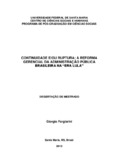| dc.creator | Forgiarini, Giorgio | |
| dc.date.accessioned | 2014-07-11 | |
| dc.date.available | 2014-07-11 | |
| dc.date.issued | 2013-04-08 | |
| dc.identifier.citation | FORGIARINI, Giorgio.Continuity and / or rupture: the management reform of public administration at brazilian "Lula´s age". 2013. 160 f. Dissertação (Mestrado em Sociologia) - Universidade Federal de Santa Maria, Santa Maria, 2013. | por |
| dc.identifier.uri | http://repositorio.ufsm.br/handle/1/6235 | |
| dc.description.abstract | It is intended with this paper to treat about the standard of rationality embedded to the Brazilian Public Administration by the management reform, started by the President Fernando Henrique Cardoso, and especially to treat about its continuation whether or not during the mandates of his opponent and successor, Luiz Inácio Lula da Silva (2003-2005 and 2006-2009). For drawing up the study, firstly, it was outlined, from the method of literature review, a foreshortened history about the different standards of rationality prevailing in different periods of the Brazilian Republic, from the patrimonial model characteristic of the Empire and first Republic (oligarchy) times, through the bureaucratic pattern opened in Brazil in the 1930s at the government of Getúlio Vargas, until the first movements towards reform of the Brazilian Public Administration management. Subsequent to this, it was analyzed the concepts of rationality starting from the theoretical and doctrinarian bias, by taking up base those ones established by Max Weber, differentiating the rationality concerning the ends (zweckrational), regarding the values of rationality (wertrational). In the same way, standards of rationality applied to management and bureaucratic models of public administration were analyzed theoretically, to from then, objectively define premises and assumptions that guide and define them. Further, the movements were addressed during the FHC government beginning to introduce new paradigms for Brazilian Public Administration and, finally, it was analyzed the measures and postures adopted by President Lula regarding the Brazilian Public Administration after his rise to power, for, in the light of objective data and theoretical concepts launched in the dissertation, completed by relative continuity and to some extent, afraid about the management reform during the mandates of President Lula. | eng |
| dc.format | application/pdf | por |
| dc.language | por | por |
| dc.publisher | Universidade Federal de Santa Maria | por |
| dc.rights | Acesso Aberto | por |
| dc.subject | Burocracia | por |
| dc.subject | Administração pública | por |
| dc.subject | Reforma gerencial | por |
| dc.subject | Governo Lula | por |
| dc.subject | Bureaucracy | eng |
| dc.subject | Public administration | eng |
| dc.subject | Management reform | eng |
| dc.subject | Lula government | eng |
| dc.title | Continuidade e/ou ruptura: a reforma gerencial da administração pública brasileira na era Lula | por |
| dc.title.alternative | Continuity and / or rupture: the management reform of public administration at brazilian "Lula´s age" | eng |
| dc.type | Dissertação | por |
| dc.description.resumo | Pretende-se com o presente trabalho tratar sobre o padrão de racionalidade incorporado à Administração Pública brasileira pela reforma gerencial, iniciada pelo Presidente Fernando Henrique Cardoso e, principalmente, sobre a sua continuidade ou não durante os mandatos de seu opositor e sucessor, Luiz Inácio Lula da Silva (2003-2005 e 2006-2009). Para a elaboração do trabalho, traçou-se, num primeiro momento, a partir do método da revisão bibliográfica, um escorço histórico acerca dos diferentes padrões de racionalidade preponderantes em diferentes períodos da República Brasileira, desde o modelo patrimonialista característico dos tempos de Império e da Primeira República (oligárquica), passando pelo padrão burocrático, inaugurado no Brasil na década de 1930 nos governos de Getúlio Vargas, até os primeiros movimentos rumo à reforma gerencial da Administração Pública brasileira. Posteriormente a isso, foram analisados, a partir de viés mais teórico e doutrinário, os conceitos de racionalidade, tomando-se por base aqueles estabelecidos por Max Weber, diferenciando-se a racionalidade quanto a fins (zweckrational), da racionalidade quanto a valores (wertrational). De mesma forma, foram teoricamente analisados os padrões de racionalidade aplicados aos modelos burocrático e gerencial de administração pública para, a partir de então, definir objetivamente premissas e pressupostos que os orientam e definem. Na sequência, foram abordados os movimentos iniciados durante o governo FHC no sentido de introduzir novos paradigmas à Administração Pública brasileira e, por fim, foram analisadas as medidas e posturas assumidas pelo Presidente Lula no que tange à Administração Pública brasileira após sua ascensão ao poder, para, à luz dos dados objetivos e conceitos teóricos lançados na dissertação, concluir pela continuidade relativa e, até certo ponto receosa, da reforma gerencial durante os mandatos do Presidente Lula. | por |
| dc.contributor.advisor1 | Perez, Reginaldo Teixeira | |
| dc.contributor.advisor1Lattes | http://lattes.cnpq.br/1378204180017338 | por |
| dc.contributor.referee1 | Fonseca, Pedro Cezar Dutra | |
| dc.contributor.referee1Lattes | http://lattes.cnpq.br/9511067342067027 | por |
| dc.contributor.referee2 | Araujo, Luiz Ernani Bonesso de | |
| dc.contributor.referee2Lattes | http://lattes.cnpq.br/3818976588714214 | por |
| dc.creator.Lattes | http://lattes.cnpq.br/0224598292905793 | por |
| dc.publisher.country | BR | por |
| dc.publisher.department | Sociologia | por |
| dc.publisher.initials | UFSM | por |
| dc.publisher.program | Programa de Pós-Graduação em Ciências Sociais | por |
| dc.subject.cnpq | CNPQ::CIENCIAS HUMANAS::SOCIOLOGIA | por |


